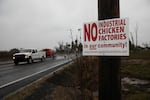In Linn County, a coalition of farmers and residents has, for years, pushed back against plans for a huge chicken farm they say could pollute the local drinking water and a nearby river. Now, following a decision from the Oregon Department of Agriculture, that group says it’s gearing up to keep fighting.
On Thursday, the Oregon Department of Agriculture and the Oregon Department of Environmental Quality issued a modified confined animal feeding operation, or CAFO, permit to J-S Ranch. The owner of the farm, Eric Simon, is proposing to build 11 large barns and raise about 3.4 million broiler chickens per year at a 60-acre property near Scio, a farming community in the middle of the Willamette Valley.
That decision comes after those two agencies temporarily withdrew a previous version of the farm’s CAFO permit ahead of a court challenge scheduled to go on trial in May.
The state’s department of agriculture withdrew the permit for “reconsideration”, a spokesperson told OPB.
A group of farmers and residents, Farmers Against Foster Farms, had filed the challenge in the Linn County Circuit Court.

FILE - A sign declares opposition to large chicken grow-out facilities planned in Scio, Ore., east of Salem in this Dec. 9, 2022, photo.
Bradley W. Parks / OPB
People opposing the large farm say the site floods easily, that the farm would produce tons of manure and harmful gasses, and they fear it could pollute the nearby North Santiam River — a tributary to the Willamette River.
In an Aug. 16 public notice, the ODA announced it was proposing to issue J-S Ranch what’s called a National Pollutant Discharge Elimination System, or NPDES, individual CAFO permit. While that permit includes some stronger requirements, like underground moisture sensors to test for nitrates, opponents say not much else is different from the original permit the state had issued in 2022.
“We were willing to give the Oregon Department of Agriculture the benefit of the doubt and that they were going to go back to re-examine their permit and see the flaws,” said Kendra Kimbirauskas, a Scio farmer and a member of Farmers Against Foster Farms. “However, what they brought back to us is still inadequate.”
Related: Controversial Linn County chicken ranch put on hold following permit withdrawal
Kimbirauskas said this new permit does not address the group’s concern about ammonia emitted from the chicken barns, which could then settle into the soil and waters of the North Santiam River. She said although the farm will be required to install underground moisture sensors, there’s no requirement for surface water sensors.
“This is a bad site. This is not the kind of agriculture that should be at this location,” Kimbirauskas said. “And the fact that they’re allowing it to go forward shows frankly, this should be an embarrassment for Gov. Kotek who worked very hard the last legislative session to establish new rules that these large concentrated animal feeding operations now have to abide by.”
Last year, Gov. Tina Kotek signed Senate Bill 85 into law. The law adds more state oversight, new requirements and definitions for larger CAFO-permitted farms — small and medium-sized facilities are largely unaffected.
Eric Simon, the owner of J-S Ranch, said the entire process has been both a financial and emotional rollercoaster. Simon, who runs another chicken farm south of Scio in Brownsville, said he was getting ready to begin construction at the new site before the state withdrew his previous permit earlier this year.
“It frustrates me because these people who claim that they want smaller farms, and they want local agriculture, the way I see it is all they’re doing is making it hard for the small producer to be able to ranch in Oregon,” Simon said. “And the only ones who are going to be able to ranch are big investors that have deep pockets who can weather the storm.”
Related: How Oregon farms manage manure and what’s changing this year
Simon said he disagrees with the argument that his property floods. He said the area where he plans to build the barns is elevated and away from the river, and that he wouldn’t build the barns where they could drown or get wet.
“I’m on the uphill side, I’m in the same plane as the houses that are there and those houses haven’t flooded,” Simon said. “So how can they say my field floods when those houses are on the same plane as mine?”
Amy van Saun, an attorney at nonprofit Center for Food Safety — a group representing local families and farmers — said they plan to go back to court.
“The fact is the neighbors in the community have also been on an emotional rollercoaster and being afraid of [the farm harming] the water that they drink and the river that they recreate in and the habitat so many species [depend on],” van Saun said. “Their livelihoods will be impacted by this.”
